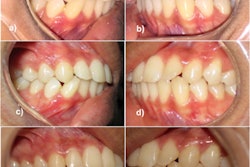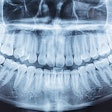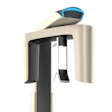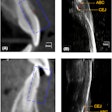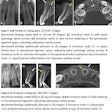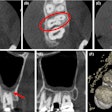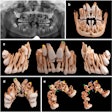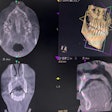
Cone-beam computed tomography (CBCT) scans show antihypertensive drugs may positively affect the thickness of the jawbone cortex, possibly preventing bone loss. The study was published April 4 in Oral Surgery, Oral Medicine, Oral Pathology and Oral Radiology.
The study authors believe it is the first study that used CBCT to investigate the effects of drugs to treat high blood pressure on the cortical thickness of the jaw. If further studies prove that antihypertensive drugs have the potential to improve the density and cortical thickness of the jaw, dental practitioners may change how they assess and select patients for treatment, including dental implant therapy, the authors wrote.
"Antihypertensive medications may have a protective effect against age-related bone loss as measured by cortical thickness of the ramus," wrote co-author Dr. Brett Spenrath, chief resident, department of oral and maxillofacial surgery, of the University of Rochester Eastman Institute for Oral Health in New York (Oral Surg Oral Med Oral Pathol Oral Radiol, April 4, 2022).
Chronic high blood pressure can negatively affect bone density. Recent research has shown that using antihypertensive prescriptions -- including calcium channel blockers, angiotensin-converting enzyme inhibitors, and beta blockers -- may lessen age-related bone density loss and cut the risk of hip fractures. However, the issue remains up for debate, because other studies have failed to show how high blood pressure medications affect bone density, according to the authors.
The issue of bone density is a critical one for dentistry, because bone morphology can affect dental implant survival. Implants placed in thick cortical bone have higher primary stability, which is a major indicator that they are less likely to fail.
To explore the link between use of antihypertensive medication and jaw cortical thickness, researchers obtained CBCT scans from 169 patients who underwent imaging for reasons unrelated to the study. Of those patients, 67 used antihypertensives, according to the study.
An examiner measured the thickness of the buccal cortex of the ramus of the jaw at the height of the occlusal plane. From the measurements, the examiner assessed the average buccal cortical thickness for every patient.
After reviewing the scans, a mean difference of .21 mm in cortical thickness was found between those who didn't take high blood pressure medication and those who did, suggesting the drugs may have a preventive effect against bone loss, the authors wrote.
While the study used a relatively small number of CBCT scans, it adds new evidence that a link may exist between the use of antihypertensive drugs and bone thickness. If these results are validated by additional studies, the findings may one day affect the clinical outcomes of patients who undergo procedures, including dental implant therapy and treatment for jaw fractures, according to the authors.
"In the mandible, we found that antihypertensive medications have a positive effect on the cortical bone thickness," Spenrath and colleagues concluded.







